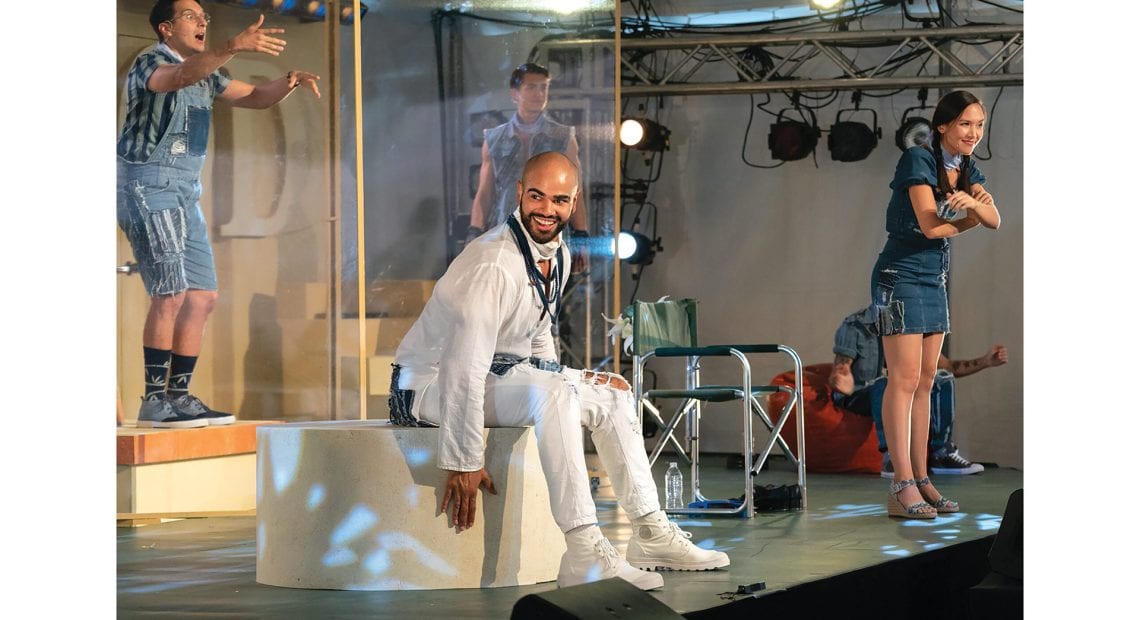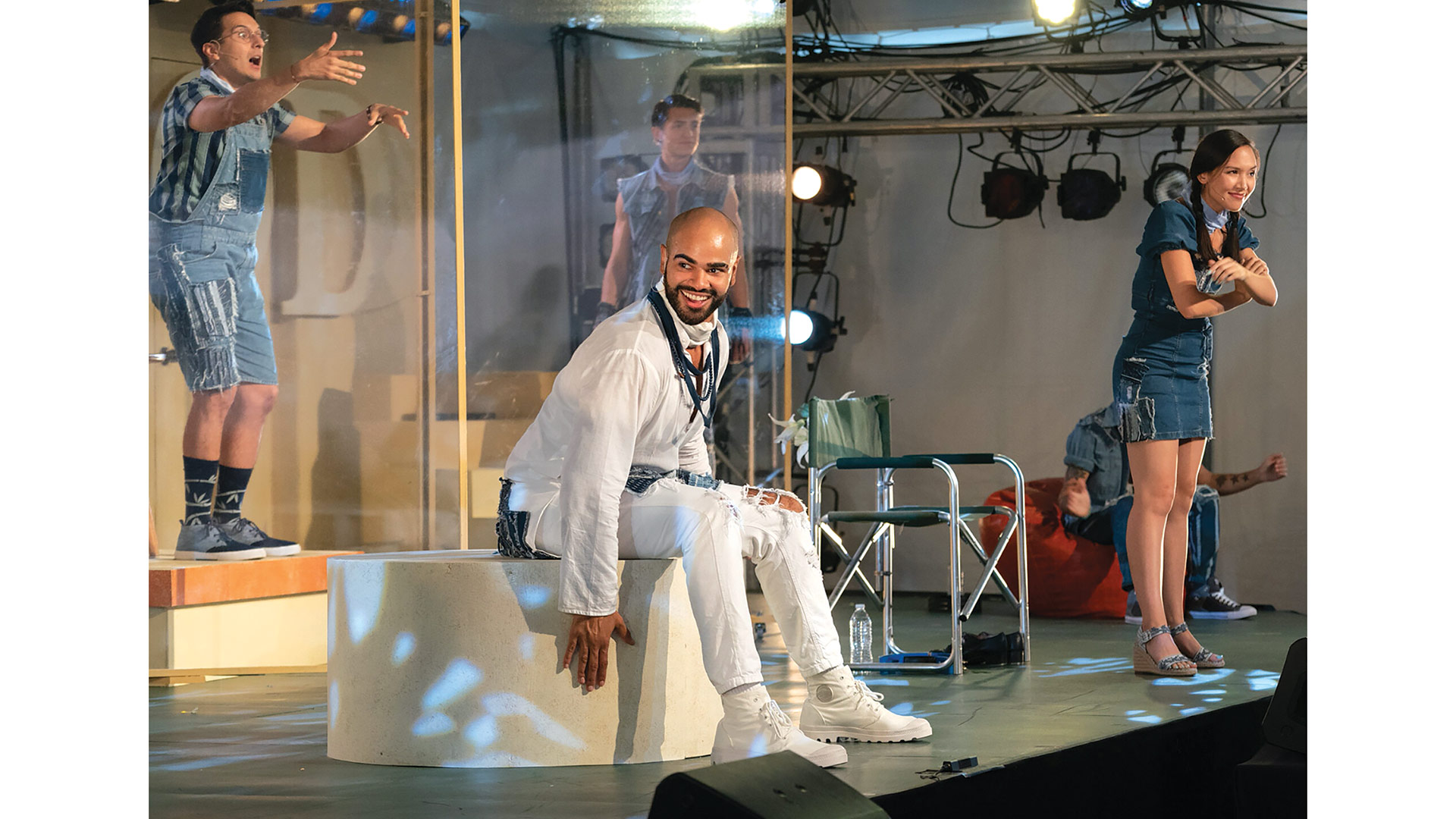
Visitor Economy Takes a Hit in the Berkshires
Culture Shock

It took plenty of creativity — in the set design and elsewhere — but Berkshire Theatre Group managed to present a musical in August when no one else could.
For the folks at Berkshire Theatre Group, things were going according to plan.
A three-year sustainability plan, to be specific, developed back in 2018, said Nick Paleologos, the organization’s executive director.
“We had a checklist of things we needed to do in addition to putting on a decent artistic season in 2019, and we hit a lot of goals. As we hit 2020, we had just two or three outstanding boxes left unchecked, when all of a sudden, in mid-March, our world was turned upside down.”
Versions of that story have been told countless times not only in Massachusetts, but around the country and the world. But for the performing arts, it’s been a particularly tough stretch.
“Starting around St. Patrick’s Day, all we were doing was canceling shows and returning money; we were really in a kind of freefall,” Paleologos continued. “What initially saved us in the short term, and bought us time to figure out how to reimagine our 2020 season, was the Paycheck Protection Program. That was a lifeline, and it accomplished exactly what it was supposed to do — it allowed us to stay in business for those crucial eight weeks in the spring.”
The 2020 season — the BTG was planning eight shows in its three indoor spaces in Stockbridge and Pittsfield — was certainly about to change. “All of a sudden, we had no idea whether we’d be allowed to perform at all,” he noted.
The journey that followed, culminating in live, outdoor performances of Godspell in August and September (more on that later), was a remarkable one, but it’s hardly the robust schedule the venerable company normally puts on. Meanwhile, performing-arts destinations like Jacob’s Pillow and Tanglewood canceled their live slates completely.
It’s a story that affects more than arts patrons; it impacts no less than the entire Berkshires economy, which is so intertwined with, and dependent on, culture and tourism.
Nick Paleologos
“We hit 2020, we had just two or three outstanding boxes left unchecked, when all of a sudden, in mid-March, our world was turned upside down.”
“The visitor economy is definitely a backbone sector for us; it supports a tremendous amount of dollars in the region,” said Jonathan Butler, president and CEO of 1Berkshire, the multi-faceted agency that focuses on tourism, economic development, and business retention in Massachusetts’ westernmost county.
In fact, he noted, visitor dollars spent in the region over the years are approaching the $1 billion mark — and the presence of cultural attractions and other tourist destinations, from restaurants to ski resorts, is a major quality-of-life factor in business owners wanting to set up shop here.
“We were pretty heavily involved in the state’s reopening process — we played a key role in getting some of the museums open and fleshing out guidelines for hotels and restaurants,” Butler told BusinessWest, while 1Berkshire’s website has become an oft-updated clearinghouse of information on the region and its public-health response to COVID-19.
Due to belt-tightening everywhere, including among its strategic partners, 1Berkshire hasn’t operated with the same marketing budget it normally would. “But we have been able to raise enough money to do some things, and we’ve pivoted to a vision of the Berkshires that talks a lot about outdoor recreation, and about our museums and hotel properties that have been able to open.
“We’re talking about the Berkshires as an escape from the city,” he went on. “We’ve been trying to tell the story of the Berkshires as a place people can escape to and enjoy the outdoors. And, honestly, we’re feeling better than we were two or three months ago.”
A few success stories will do that, but stakeholders in the region are certainly hoping 2021 looks a lot different than 2020.
Out and About
Take, for example, Bousquet Mountain, which recently hired a new general manager and announced a series of renovations, including a new summit-to-base triple chairlift and a revamped snow-making system with more than 25 new snow guns, as well as new grooming equipment and a new, more accessible beginner area.
In addition, Pittsfield native and two-time Olympian Krista Schmidinger will partner with Bousquet to further the site’s youth programming, contributing to the Race Club and SnowSports School and assisting with race and school-program design, instruction, and one-on-one opportunities for young skiers. All this speaks to a resort expecting a busy season, even in the midst of COVID-19.
As for Berkshire Theatre Group, it had to fight to get a live production staged — a fight marked by creativity, not animosity. In short, the Actors Equity Assoc. wasn’t allowing any of its 59,000 unionized members to work in 2020 unless the safety of the actors could be assured.
Jonathan Butler
“We’re talking about the Berkshires as an escape from the city. We’ve been trying to tell the story of the Berkshires as a place people can escape to and enjoy the outdoors.”
“We’re an Equity company, so that puts a little crimp in our plans,” Paleologos said. To stage Godspell, Artistic Director and CEO Kate Maguire developed a 60-page manual with detailed safety protocols, including quarantining, physical distancing, and regular coronavirus testing for actors. The actors were to be kept six feet apart at all times — 10 feet when singing — with this spacing and plexiglass dividers incorporated into the set design itself.
Maguire was denied at first, “but she was relentless,” Paleologos said. “She wouldn’t take no for an answer.”
When the company and the union finally struck a deal, BTG became the only company in the entire country performing or rehearsing a musical — a major success, he noted, considering that, just weeks earlier, no one knew whether they’d have a live theater season at all, and most companies nationwide didn’t attempt one, moving instead to virtual performances only.
Meanwhile, many patrons of canceled BTG shows exchanged their tickets for future credits or donated the tickets back as contributions, as a show of support for a company — and an industry — so important to locals.
“This is not a sustainable model going forward, performing under a tent for 50 people,” Paleologos said. “But it was a miraculous success story that was totally unexpected. Our goal was just to be a beacon of hope in an otherwise dismal moment in Berkshire County.”
It’s not the only such beacon.
“It’s too soon to gauge anything in the quantitative sense, but from what I’ve heard anecdotally, in conversations with different sectors in the visitor economy, those that have reopened have done all right,” Butler said. “A lot have changed their model — some hotels have a three-night minimum because of the cleaning expenses of turning over a room, and some businesses are closed a day or two a week to focus on cleaning and sanitizing.”
Last week, Main Street Hospitality Group, which operates several hotels in the region, announced the hiring of a COVID compliance officer, or CCO, who makes monthly visits to each hotel for routine inspections and engagement with staff and leadership. A board-certified physician, the officer strictly adheres to mandates from the state and the Centers for Disease Control and Prevention, and stays informed on the latest public-health advancements in order to advise on any necessary changes to the hotels’ protocols and procedures.
“In addition to several months of strategic planning that led to our initial creation of safeguards, it is equally important to continue evaluating our health and safety practices with the CCO’s help and expertise,” said Sarah Eustis, Main Street’s CEO. “A trusted editor was needed to process the ever-changing breadth of information out there.”
Meanwhile, the hotel group has also partnered with Blue Canary, a company that trains hotels in hospital-level cleaning methods and conducts regular check-ins. Main Street’s housekeeping leaders participated in three days of intensive sessions that focused on best practices and heightened awareness. Attendants were trained in techniques that include longer cleaning times, stronger disinfectants, new cleaning tools, and identifying critical, high-touch areas that require the most attention to ensure guest health and safety.
“This new reality has impacted our housekeeping teams in a huge way,” Eustis said. “Main Street Hospitality is committed to staying at the forefront of this.”
Restaurants have had barriers to overcome as well, Butler said, especially those that depend on visitor traffic at other area attractions. “Some have been able to pivot and focus on a delivery and takeout model, while others haven’t made the transition as seamlessly, and many don’t have the square footage inside to sit too many, and if they’re not able to adapt some outdoor seats, it can be challenging.”
The soon-to-arrive colder weather will force many eateries to become more creative until the state lifts restrictions on indoor capacity — and patrons feel safe enough to eat indoors.
“We certainly understand some businesses will have to make more permanent decisions about their fate. And some businesses, unfortunately, won’t make it to the other side of this,” Butler said. “But the outdoor recreation scene has been very busy — it’s flourishing this summer, and that will continue into the fall.”
Lessons Learned
Paleologos told BusinessWest that banks did a good job easing loan terms for cultural organizations and other nonprofits in the spring, and argues that the next step would be a permanent shift in that direction.
Writing this month in Berkshire Trade & Commerce, he cited a study in Berkshire Blueprint 2.0, an economic-development plan for Berkshire County, showing that jobs in the creative industry grew at a faster pace than in any of the other sectors examined.
“In other words, cultural nonprofits are absolutely central to the Berkshire brand,” he wrote. “The profitability of other commercial industries depends heavily on the success of this county’s theatres, museums, music, and dance companies. Creating new and innovative financial products that contribute to the long-term sustainability of the nonprofit sector must become a top priority for local banks. As an example, sufficiently collateralized operating loans to nonprofits must be offered at the most favorable rates — not the least.”
Meanwhile, Butler added, bringing visitor traffic back to 2019 levels will depend largely on people’s confidence regarding safety, and the public-health metrics on that front have been very good in the Berkshires. “We’re optimistic that will continue and we’ll come out in a stronger place at the end of this.”
That said, there certainly has been a visitor footprint in the Berkshires this year, he went on.
“We won’t have hard data until 2021, and I’m certain it’s going to be down — we don’t have a lot of the key economic drivers, like Jacob’s Pillow and Tanglewood. But on the plus side, we’ve seen a lot of visitation from Eastern Mass.; they see us as the rural side of the state. We’ve had a lot of visitors from Connecticut and New York. Second homeowners have been living here since March, making their Berkshire residence more permanent during the pandemic. All those dollars circulate back into the local economy, which is a good thing.”
Any forward momentum is welcome, Paleologos added. But so much still remains in flux.
“We can’t guarantee, by the time we get to next summer, we’ll be in a situation where we’ll be able to have shows indoors again,” he said. “The good news is, having had this experience, being able to find a way to do it outdoors, maybe we could incorporate a hybrid model, under tents and indoors. A lot is up in the air at this point, depending on how fast a reliable vaccine comes on the market and how much public confidence there is at its safety and efficacy.”
He noted that the theater business goes back to an amphitheater cut into the hillside at the Parthenon 2,500 years ago — and likely before that.
“From then up to now, the bedrock of our business is people coming together in a single place to have a shared experience and to learn a little bit about what it is to be a human being,” he said. “That’s what we do.”
That’s what the Berkshires do, too, bringing people together every year for an array of activities, many of which have been curtailed in this year of COVID-19.
But the show will go on, eventually — with or without plexiglass.
Joseph Bednar can be reached at [email protected]






